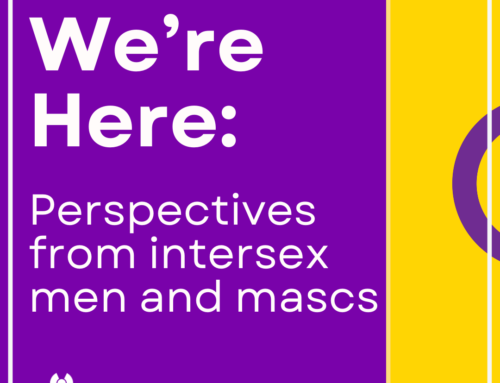AIC is proud to share the second in a series of interviews with key leaders and supporters who have helped make AIC the strong organization we are today! Meg, one of our key supporters, shares part of her journey as the next story in AIC’s series, Turning the Lens Inward.
I first heard about AIC when I met Anne Tamar-Mattis in 2007. She told me about her thoughts on how direct legal strategy could be employed to successfully protect kids born with variations of sex anatomy. I remember walking away inspired by the potential for this approach, and determined to help AIC grow.
My wife and I knew both of our children were born with intersex conditions before we adopted them. Our son was assigned female close to his birth and, as it happened, very little time passed before he made it clear to us that he is a boy. AIC helped us secure local legal counsel, and they were there as we developed our own approach to convince a judge to agree to amend our son’s legal documents. AIC’s skill and experience gave us confidence through this process, and made it possible for our son to avoid the unnecessary stress that would come from simply registering for school, or sports, with incorrect documents. We weren’t alone like so many families before us.
I have a deep desire to see the current model of treatment for intersex kids change, especially the widely held belief that genital differences are something to be “fixed”. We are profoundly grateful that our son was not subjected to feminizing genital surgery during the time he was wrongly thought to be a girl. Others have not been so lucky, and yet the practice of recommending early genital surgery continues.
The greatest challenge seems to be moving the entrenched medical “experts”. It is frustrating to know how many medical professionals think parents need protection from, instead of connection with, other parents who are also raising kids like ours, when the truth is that sharing my experiences with other parents has saved my family from years of needless isolation, and provided us with the confidence that our children will grow up with the information and peers they need. That doctors continue to recommend “normalizing” genital surgeries when the outcomes (physical and emotional) have shown to be so poor, is maddening. I am equally frustrated so little research is being done to address quality of life questions – such as developing strategies to minimize the harm of repeated genital exams, understanding the proper hormone maintenance at all stages of life, and understanding the experiences of children who grow up without surgical intervention.
Through seeing the powerful work of AIC, my commitment to their success has only grown. I am particularly impressed and encouraged by AIC’s youth leadership development program, Inter/Act, and the powerful oral histories brought to us by The Interface Project (an independent program fiscally sponsored by AIC).
I hold out great hope that the scope of AIC’s work will help introduce a new understanding and acceptance of intersex – that we will soon celebrate more legal victories in the South Carolina (M.C.) case, and that stories of experience joined with smart legal strategy will win legal safeguards for every child, for every family.






